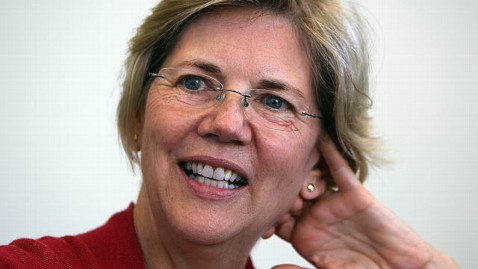Mass. Senate Race: Warren's Cherokee Ancestry Stirs Debate

John Tlumacki/The Boston Globe/Getty Images
To hear her opponents tell it, Massachusetts Senate candidate Elizabeth Warren cheated the system for years.
Warren, 62, listed herself as a minority, based on a far-back Cherokee bloodline. How far back? Warren's great-great-great-grandmother was listed as Cherokee on her 1894 marriage license, genealogists discovered.
The story has dominated the political news cycle in Massachusetts since it first broke last Friday. And to be sure, Elizabeth Warren has had a horrible week since then.
But amid all of the inquiry into Warren's ancestry and all of the questions as to why she did in fact self-identify as Native American, two overarching questions still remain. First and foremost, did Warren actually use her heritage to get ahead in her career? And what's the lasting damage from the story?
There's no doubt that Warren has an impressive resume. She has taught law at numerous prestigious universities, including Harvard, where she currently serves as the Leo Gottlieb Professor of Law.
In 2008 she was tasked with heading the Congressional Oversight Panel to oversee the Troubled Assets Relief Program (more commonly referred to as TARP.) She is credited with being the driving force behind the creation of the Consumer Financial Protection Bureau. She made Time Magazine's list of 100 Most Influential People In the World in 2009 and 2010.
Many of Warren's past employers have come forward on her behalf, stating that their decision to hire her was in no way based on her heritage.
"When the Harvard Law School faculty voted in the early 1990's to make Elizabeth Warren an offer of a tenured professorship at our School, the decision was based on three factors: our goal of adding a top-notch academic expert in debtor-creditor law to the regular faculty; her excellent scholarship in that field; and her fabulous success as a teacher. Her Native American heritage was not a factor in the discussion or the decision," said Robert Clark, former Dean of Harvard Law School.
"To suggest that she needed some special advantage to be hired here or anywhere is just silly. She was hired for her great abilities as a teacher and a scholar. Her family tree had nothing to do with it," said Jay Westbrook, Benno C. Schmidt Chair of Business Law at University of Texas, where Warren taught in the 80's.
The only person who could answer the question as to whether Elizabeth Warren used her ancestry to get ahead is Elizabeth Warren.
Warren's comments on the topic have not helped her case very much. First Warren explained that she listed herself as a minority in the hopes that she might meet what she described as "people like her." When pressed again about the subject by local reporters, Warren said her Aunt Bee used to envy Warren's grandfather's "high cheekbones" -which Aunt Bee used to describe as a physical characteristic of Native Americans.
Still, there is an advantage to identifying as a minority within the realm of academia, says Larry Sabato, director of the University of Virginia's Center for Politics and a fellow professor.
"It is an advantage to be qualified as a minority if you're looking for a job, or you're looking to get a counter-offer," Sabato said. "So to an academic looking at these facts, it appears fairly obvious why she did it."
Whether or not Warren truly intended to game the system, Sabato says that damage has been done by this story, and it's not insignificant.
"Her campaign had made a lot of progress in reconstructing her image from the elitist Harvard professor to a woman from a blue-collar background. They had redefined her image and it was helping her. But this redefined it again," Sabato noted. "That's the tragedy of it for her. It's wiped out all the progress that they had made of removing that big obstacle."
The good news for Warren? Election day is still six months away, and in politics, six months is practically a lifetime.
"It's May, the election's in November, and everything seems vitally important on the day it happens" Sabato said. "And two weeks later we're trying to remember the details."